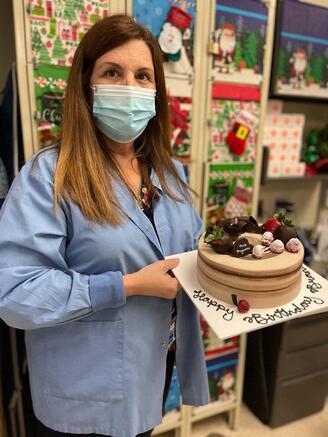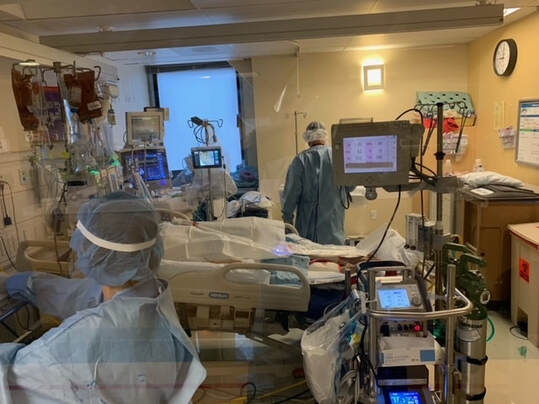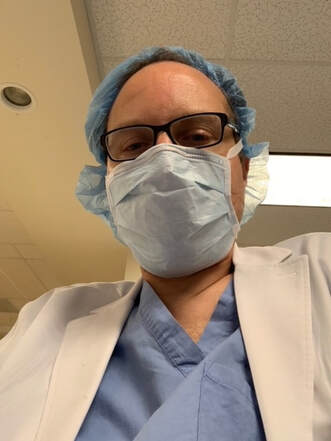By Leila Salam and Saanvi Thakur with additional reporting by Lia Klebanov
 Brandy Van Zandt celebrates her birthday at work
Brandy Van Zandt celebrates her birthday at work
Life changing. This is how healthcare professional Brandy Van Zandt describes the impact the COVID-19 pandemic has had on her not only as a frontline worker, but also as a mother and wife. This description is not unique to Van Zandt, as the coronavirus has burdened and overwhelmed healthcare workers across the country, according to a psychiatric study done by Science Direct.
The struggles of frontline workers are much closer than most students realize, as many HHS parents are frontline healthcare workers, like Van Zandt.
“Everything from our professional to our personal lives has changed in the last year,” Van Zandt said. “My husband's father is in a skilled nursing home [so] he's only been able to go there one time, since we're in health care.”
Similar to Van Zandt, people around the world have been disconnected from family members and are unable to spend time with high-risk loved ones, according to ABC news. This can be credited to the uniqueness of the coronavirus and the initial lack of information about the disease.
“I think many of us are learning a lot of things about patient care and medicine,” Kaiser Permanente ICU pulmonary critical care physician Hugh Harris said. “Since this pandemic has started, we are trying to assess whether our traditional treatments are appropriate for these patients or whether new, innovative or different ways to think about care should be applied to these patients.”
The struggles of frontline workers are much closer than most students realize, as many HHS parents are frontline healthcare workers, like Van Zandt.
“Everything from our professional to our personal lives has changed in the last year,” Van Zandt said. “My husband's father is in a skilled nursing home [so] he's only been able to go there one time, since we're in health care.”
Similar to Van Zandt, people around the world have been disconnected from family members and are unable to spend time with high-risk loved ones, according to ABC news. This can be credited to the uniqueness of the coronavirus and the initial lack of information about the disease.
“I think many of us are learning a lot of things about patient care and medicine,” Kaiser Permanente ICU pulmonary critical care physician Hugh Harris said. “Since this pandemic has started, we are trying to assess whether our traditional treatments are appropriate for these patients or whether new, innovative or different ways to think about care should be applied to these patients.”
 Hugh Harris works at Kaiser Permanente ICU, where as of March 12th there is currently 99% I.C.U. occupancy
Hugh Harris works at Kaiser Permanente ICU, where as of March 12th there is currently 99% I.C.U. occupancy
As the pandemic has continued, medical professionals have used different treatments to care for patients; however, it is difficult to assess whether there should be a change in the medical actions taken as some treatments may not be appropriate, Harris said.
A year into the pandemic, coronavirus cases have significantly decreased and while Santa Clara county remains in the second most restrictive tier, other counties have begun or plan to reopen in the near future. Even so, medical professionals continue to face many hardships in and out of the hospital, Harris said.
“I think the hardest thing other than obviously the risk of [my dad] getting sick and bringing it home is that we don't get to see [him] as much,” Harris’ daughter, freshman Alison Harris said. “On average, he gets a day off a couple of times a month and he comes home pretty late. He leaves before we wake up and most of the time he comes in and goes to bed. Usually, [before] the pandemic, he would be home early every night and on the weekends, so we definitely got more time together then; it's a big adjustment.”
Harris echoed his daughter’s sentiments about taking precautions because of his profession.
“We can't slip up,” Harris said. “We have to be careful every time we do anything so that we ensure our own safety. Many people I know, including myself, don't sleep with our spouses anymore. We do our best to keep our distance.”
On top of long work hours and strict protocols, the emotional impact and trauma of being a medical professional at this time take a heavy toll in day-to-day life, Van Zandt said.
A year into the pandemic, coronavirus cases have significantly decreased and while Santa Clara county remains in the second most restrictive tier, other counties have begun or plan to reopen in the near future. Even so, medical professionals continue to face many hardships in and out of the hospital, Harris said.
“I think the hardest thing other than obviously the risk of [my dad] getting sick and bringing it home is that we don't get to see [him] as much,” Harris’ daughter, freshman Alison Harris said. “On average, he gets a day off a couple of times a month and he comes home pretty late. He leaves before we wake up and most of the time he comes in and goes to bed. Usually, [before] the pandemic, he would be home early every night and on the weekends, so we definitely got more time together then; it's a big adjustment.”
Harris echoed his daughter’s sentiments about taking precautions because of his profession.
“We can't slip up,” Harris said. “We have to be careful every time we do anything so that we ensure our own safety. Many people I know, including myself, don't sleep with our spouses anymore. We do our best to keep our distance.”
On top of long work hours and strict protocols, the emotional impact and trauma of being a medical professional at this time take a heavy toll in day-to-day life, Van Zandt said.
 Harris said his shifts have significantly increased since the start of the pandemic.
Harris said his shifts have significantly increased since the start of the pandemic.
“I think I've had some days where I didn't want to hear the word ‘COVID-19,’” Van Zandt said. “I feel so bad for so many people, I feel bad for the healthcare workers because it's really hard to say goodbye for somebody else.”
As tears started to gather in her eyes, Van Zandt added, “You know, how do I tell your mom, how much you love her. It doesn't mean the same coming from me, saying, ‘I talked to your daughter. And I want you to know how much she loves you.’”
During the pandemic, doctors have the difficult role of comforting patients in place of family and other loved ones, Van Zandt said. While some families can connect virtually, ultimately it is up to healthcare professionals to continuously support coronavirus patients.
“It's very humbling to know that you can only do so much for people [and] that people are suffering alone, with the exception of often hospital personnel and caregivers,” Harris said. “People are very ill for a long time and sometimes you can feel somewhat helpless to not make them better. We also see that there's a very human side to this, especially because families can't come to see their loved ones so they're often stuck doing it by video or telephone and in some cases when patients are very sick and on ventilators and in drug-induced comas they actually don't really get any visitation at all.”
While the nation has learned to adapt and the number of cases has subsided, there are still many patients with no improvements, according to BBC.
“I think we're seeing that patients are doing a little bit better than at the beginning of the pandemic but unfortunately in the intensive care unit, just a lot of people are not getting better.” Harris said. “This is the second [wave]. We've unfortunately had a lot of death and that's what people are seeing, it's not unique to my hospital or others, but that's really hard, especially when you've taken care of people sometimes for weeks or even, a month or more, and they still pass away.”
This pandemic has brought significant changes to the medical system and a lasting impact on medical workers, and some medical professionals such as Van Zandt believe the medical system is better prepared for another pandemic.
However, other medical workers such as Harris believe the effects of the pandemic will only spur so much change, and a commitment to learning from mistakes is required to move forward.
“I think in this country, and in society in general, we're very good about reacting to things but are very poor about planning and learning lessons,” Harris said. “So I think it's going to really take investment in our public health systems and being sure that we're adequately stocked with equipment and supplies, in case this happens again, but we can't let our guard down and be reactive only because we saw how we failed this time.”
As medical workers continue to fight on the frontlines, the work they’ve done has been appreciated around the world, according to CNN.
Closer to home, medical workers like Van Zandt and Harris are the heroes of this pandemic, Van Zandt’s daughter, freshman Vivian Van Zandt said.
“Thank you for not giving up and not backing down,” Vivian said. “I feel so bad for [healthcare workers like my parents], they have to wear masks all day [which cause] indents on their face, but they still persist in helping.”
As tears started to gather in her eyes, Van Zandt added, “You know, how do I tell your mom, how much you love her. It doesn't mean the same coming from me, saying, ‘I talked to your daughter. And I want you to know how much she loves you.’”
During the pandemic, doctors have the difficult role of comforting patients in place of family and other loved ones, Van Zandt said. While some families can connect virtually, ultimately it is up to healthcare professionals to continuously support coronavirus patients.
“It's very humbling to know that you can only do so much for people [and] that people are suffering alone, with the exception of often hospital personnel and caregivers,” Harris said. “People are very ill for a long time and sometimes you can feel somewhat helpless to not make them better. We also see that there's a very human side to this, especially because families can't come to see their loved ones so they're often stuck doing it by video or telephone and in some cases when patients are very sick and on ventilators and in drug-induced comas they actually don't really get any visitation at all.”
While the nation has learned to adapt and the number of cases has subsided, there are still many patients with no improvements, according to BBC.
“I think we're seeing that patients are doing a little bit better than at the beginning of the pandemic but unfortunately in the intensive care unit, just a lot of people are not getting better.” Harris said. “This is the second [wave]. We've unfortunately had a lot of death and that's what people are seeing, it's not unique to my hospital or others, but that's really hard, especially when you've taken care of people sometimes for weeks or even, a month or more, and they still pass away.”
This pandemic has brought significant changes to the medical system and a lasting impact on medical workers, and some medical professionals such as Van Zandt believe the medical system is better prepared for another pandemic.
However, other medical workers such as Harris believe the effects of the pandemic will only spur so much change, and a commitment to learning from mistakes is required to move forward.
“I think in this country, and in society in general, we're very good about reacting to things but are very poor about planning and learning lessons,” Harris said. “So I think it's going to really take investment in our public health systems and being sure that we're adequately stocked with equipment and supplies, in case this happens again, but we can't let our guard down and be reactive only because we saw how we failed this time.”
As medical workers continue to fight on the frontlines, the work they’ve done has been appreciated around the world, according to CNN.
Closer to home, medical workers like Van Zandt and Harris are the heroes of this pandemic, Van Zandt’s daughter, freshman Vivian Van Zandt said.
“Thank you for not giving up and not backing down,” Vivian said. “I feel so bad for [healthcare workers like my parents], they have to wear masks all day [which cause] indents on their face, but they still persist in helping.”
